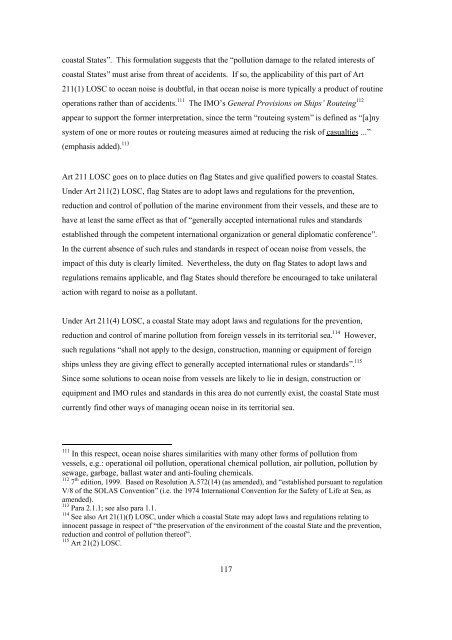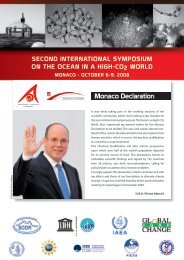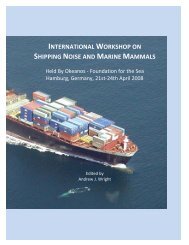Oceans of noise - Whale and Dolphin Conservation Society
Oceans of noise - Whale and Dolphin Conservation Society
Oceans of noise - Whale and Dolphin Conservation Society
- No tags were found...
Create successful ePaper yourself
Turn your PDF publications into a flip-book with our unique Google optimized e-Paper software.
coastal States”. This formulation suggests that the “pollution damage to the related interests <strong>of</strong>coastal States” must arise from threat <strong>of</strong> accidents. If so, the applicability <strong>of</strong> this part <strong>of</strong> Art211(1) LOSC to ocean <strong>noise</strong> is doubtful, in that ocean <strong>noise</strong> is more typically a product <strong>of</strong> routineoperations rather than <strong>of</strong> accidents. 111 The IMO’s General Provisions on Ships’ Routeing 112appear to support the former interpretation, since the term “routeing system” is defined as “[a]nysystem <strong>of</strong> one or more routes or routeing measures aimed at reducing the risk <strong>of</strong> casualties ...”(emphasis added). 113Art 211 LOSC goes on to place duties on flag States <strong>and</strong> give qualified powers to coastal States.Under Art 211(2) LOSC, flag States are to adopt laws <strong>and</strong> regulations for the prevention,reduction <strong>and</strong> control <strong>of</strong> pollution <strong>of</strong> the marine environment from their vessels, <strong>and</strong> these are tohave at least the same effect as that <strong>of</strong> “generally accepted international rules <strong>and</strong> st<strong>and</strong>ardsestablished through the competent international organization or general diplomatic conference”.In the current absence <strong>of</strong> such rules <strong>and</strong> st<strong>and</strong>ards in respect <strong>of</strong> ocean <strong>noise</strong> from vessels, theimpact <strong>of</strong> this duty is clearly limited. Nevertheless, the duty on flag States to adopt laws <strong>and</strong>regulations remains applicable, <strong>and</strong> flag States should therefore be encouraged to take unilateralaction with regard to <strong>noise</strong> as a pollutant.Under Art 211(4) LOSC, a coastal State may adopt laws <strong>and</strong> regulations for the prevention,reduction <strong>and</strong> control <strong>of</strong> marine pollution from foreign vessels in its territorial sea. 114 However,such regulations “shall not apply to the design, construction, manning or equipment <strong>of</strong> foreignships unless they are giving effect to generally accepted international rules or st<strong>and</strong>ards”. 115Since some solutions to ocean <strong>noise</strong> from vessels are likely to lie in design, construction orequipment <strong>and</strong> IMO rules <strong>and</strong> st<strong>and</strong>ards in this area do not currently exist, the coastal State mustcurrently find other ways <strong>of</strong> managing ocean <strong>noise</strong> in its territorial sea.111 In this respect, ocean <strong>noise</strong> shares similarities with many other forms <strong>of</strong> pollution fromvessels, e.g.: operational oil pollution, operational chemical pollution, air pollution, pollution bysewage, garbage, ballast water <strong>and</strong> anti-fouling chemicals.112 7 th edition, 1999. Based on Resolution A.572(14) (as amended), <strong>and</strong> “established pursuant to regulationV/8 <strong>of</strong> the SOLAS Convention” (i.e. the 1974 International Convention for the Safety <strong>of</strong> Life at Sea, asamended).113 Para 2.1.1; see also para 1.1.114 See also Art 21(1)(f) LOSC, under which a coastal State may adopt laws <strong>and</strong> regulations relating toinnocent passage in respect <strong>of</strong> “the preservation <strong>of</strong> the environment <strong>of</strong> the coastal State <strong>and</strong> the prevention,reduction <strong>and</strong> control <strong>of</strong> pollution there<strong>of</strong>”.115 Art 21(2) LOSC.117




